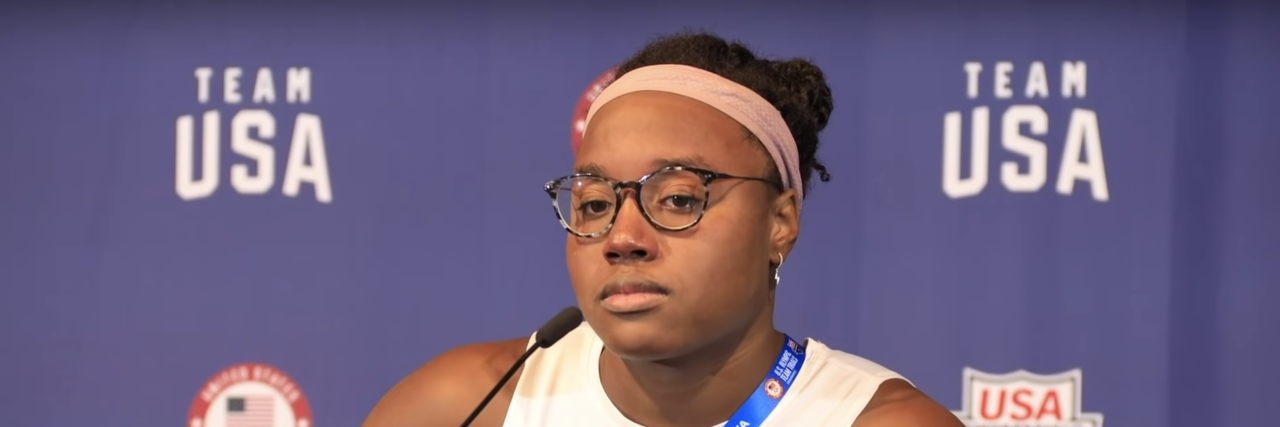Professional athletes are a wonder to me. They are people to be idolized. How can they sustain such high levels of athleticism and how is their body even physically capable of doing so? Athletes push the human body to great lengths that myself, an average athlete and scientist, cannot understand. What we often forget, though, is that athletes are human. Athletes have lives, families, friends and most importantly, mental health. Olympic athlete Simone Manuel shared with NBC Sports about her recent diagnosis of overtraining syndrome. Manuel’s body gave out, after intense training for what might encompass her whole life, leading her body to not only physically give out but also to mental health symptoms such as depression, anxiety and insomnia.
According to the National Athletic Trainers Association (NATA) athletic burnout is a “…response to chronic stress of continued demands in a sport or activity without the opportunity for physical and mental rest and recovery.”
Athletes train at high levels all the time, their minds constantly in a go-go-go mindset. High level athletes feel the pressure to perform– to work in the gym, on the field and/or in the pool 24/7 in order to maintain their competitive edge. Athletes push their bodies to great lengths trying new physical tasks to compete with their teammates or work through injuries to avoid losing training and potential play time. This constant mindset of never letting up can lead to larger consequences in an athlete’s career. Athlete’s can burn out. They can lose interest in their sport and lead to leaving the sport altogether. Athletes can experience mental and physical exhaustion, experiencing higher resting heart rate and blood pressure or loss of cognitive sharpness, as also reported by NATA.
Yes, cognitive function can be impacted by athletic burnout. It is no surprise that our bodies physically take a toll when we push it to great lengths but we also need to focus on the mental health aspect of our bodies and our brains. When we push our bodies to meet great physical demands, we sometimes forget to take care of the rest of our bodies.
I recall a stretch of time when I was marathon training, with three scheduled marathons in the time span of a year, all scheduled before having ever run one. I was following my training regimen, working on my pacing and strength, and hit a wall. I kept pushing my body to do something it had never done before. I wasn’t by any means a couch potato– I played varsity softball and travel ball growing up, I snowboarded in the winters, and ran three to four times a week, two to three miles each run, but never trained at the intensity it takes to run a marathon. I kept pushing and pushing until one day, I couldn’t get myself out of bed.
I was not only physically exhausted but mentally worn out too. I forgot to feed the dog a few times leading up to this moment and forgot about some previously scheduled meetings until it was too late. I had never been this forgetful before. I had always remembered to take care of my commitments, and then it hit me. I was experiencing burnout. Even an amateur athlete like myself experiences burnout. Anybody at any level can. I was pushing myself seven days a week, sometimes two to three hours each workout, without giving my body time to recover.
When we focus so much on one aspect of ourselves, we tend to lose sight of other aspects. Focusing too much on my physical health led me to neglect my mental health, leading to a depressive episode and the need to step back from training in order to right my ship again before setting sail.
Across professional sports, mental health needs to be talked about more. There are stories of former Chicago Cubs player Ben Zobrist needing to take time away from the sport to address his mental health needs, how depression and anxiety even almost derailed his career. He ended up starting a foundation that helps focus on mental health needs for athletes because this is an area that is often brushed under the rug.
Then there is the story of Drew Robinson, where the struggles and stress of minor league baseball led him into a deep depression, ultimately leading to a suicide attempt. The conversation needs to open up in professional sports, but especially starting young, that we must take care of our mental health. Our performance on and off the field is affected when our minds are not working at their best capacity. And that means we need to focus on mental health. Clarity on and off the field, in the training room, at the gym, is critical to ensure lasting athletes and avoiding burnout. Making sure we, as a society, give athletes the room to breathe and recognize they are individuals too, not just bodies for our entertainment value. We must treat athletes like the humans they are, giving them space to breathe and to talk openly about their mental health. We need to recognize that professional athletes are just like you and me, fighting battles in their mind that are as valid as the ones you and I fight each and every day.
Lead image via SwimSwam YouTube channel.

